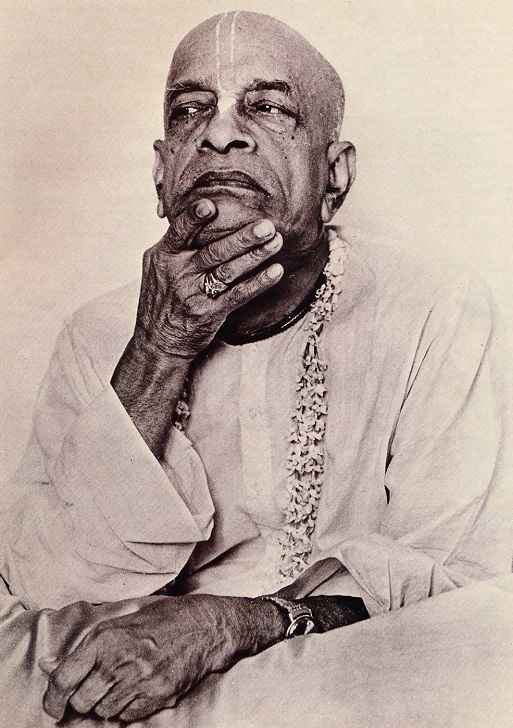(Click to enlarge photo of Srila Prabhupada)
Prabhupāda:
karma-jaṁ buddhi-yuktā hi
phalaṁ tyaktvā manīṣiṇaḥ
(BG 2.51)
Manīṣiṇaḥ. This word is very significant. Manīṣiṇaḥ means thoughtful, thoughtful. Manīṣā. Manīṣā means thought. Manīṣiṇaḥ, those who are got... those who are thoughtful, not trifling. Those who are thoughtful. Unless one is thoughtful, one cannot understand that he is not this body. Then how, how you can do work for yourself? What is your position? Now, I am consciousness. But what kind of consciousness? Subordinate consciousness. I am the part of the supreme consciousness. Then what will be your activities? My activities will be under the guidance of the supreme consciousness.
Just like in office, the managing director is the supreme consciousness. Just for example. Now, everyone is working under him, under his direction. So anyone who is working under his direction, they have no responsibility. They have got simply to discharge the duty, either pious or impious, never mind. In the military rank the order of the captain or the commander is there. The soldier has to execute it.
Never mind whether it is pious or impious, it doesn't matter. He has to act simply. Then he becomes a, I mean to say, real soldier. If he acts in that way, he gets remuneration, he gets reward, he gets title, he gets honor. He doesn't care. The commander asks him, "Just go and kill the enemy." He goes and kills. He gets reward. But killing, do you mean to say by killing one gets reward? No. For the duty discharged. For the duty discharged.
Similarly, here the whole position is that Kṛṣṇa is instructing Arjuna. Kṛṣṇa is the supreme consciousness, and Arjuna has to discharge only according to the order of the supreme consciousness. So my... Manīṣiṇaḥ. Manīṣiṇaḥ means those who are thoughtful philosopher, those who can take up things by philosophical conclusion that, "I am consciousness. I am the part and parcel of the supreme consciousness. Therefore my duty is to act according to the supreme consciousness."
Just like your hand is the part of your body. Now, it is moving according to my consciousness. The hand is not moving in its own way. As I want, that let the hands be moved, let my legs be moved, let my eye be opened and see, so I am dictating and these parts are working. Similarly, we are all parts and parcel of the supreme consciousness. When we train ourself to move and act in according to that supreme consciousness, then we become transcendental to all these pious or impious activities. That is the technique.
So, karma-jaṁ buddhi-yuktā hi phalaṁ tyaktvā manīṣiṇaḥ. Manīṣiṇaḥ means thoughtful, those who are thoughtful, those who have understood that, "I am the part and parcel of the supreme consciousness, and let me act in that way" ...then what will be the result? Just see the fine result: janma-bandha-vinirmuktāḥ padaṁ gacchanty anāmayam (BG 2.51). "Then he becomes free from the bondage of birth and death, no more birth and death."
Janma-bandhana. This is a... this is a very strong shackle. You see? Janma. Janma-mṛtyu-jarā-vyādhi (BG 13.9). The modern scientists, modern philosophers, they do not think about these four things, janma-mṛtyu-jarā-vyādhi, birth, death, disease and old age. They set it... set them aside: "Oh, let them be happy. Let us enjoy this life, hogs and dogs." This is not human life. Human life is meant to make a solution of this bondage: life... I mean, birth, death, disease and old age. If the human civilization has not made a solution of these four things, oh, that is not human civilization. Human civilization is meant for making a complete solution of these things.
So here, in the Bhagavad-gītā, just see how the Lord says that karma-jaṁ buddhi-yuktā hi. Karma-jam. Karma-jam means whenever you act, there will be some reaction. If you act good things, there will be a good reaction. If you act bad things, there will be bad reaction. But reaction, either good or bad, that is, in higher sense, all suffering. I have already explained to you another, some other day, that suppose by good action I get good birth, good riches and good features of the body, good education—all these thing I get—but that does not mean that I am free from the material pangs.
The material pangs are janma-mṛtyu-jarā-vyādhi (BG 13.9): birth, death, old age and diseases. Because you are rich man, because you are beautiful man, because you are educated man, because you are born in a aristocratic family, that does not mean that you have avoided death, old age and disease.
So we shall not be concerned with pious activities or impious activities. We shall be concerned with transcendental activities. That will save me from this bondage of birth, death, old age and disease. That should be our aim of life.
(Srila Prabhupada Lecture, San Francisco, March 25, 1967)
.
.
